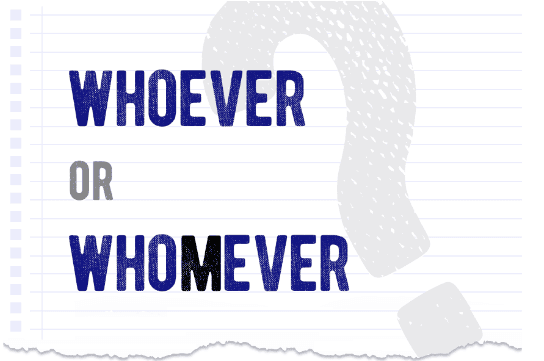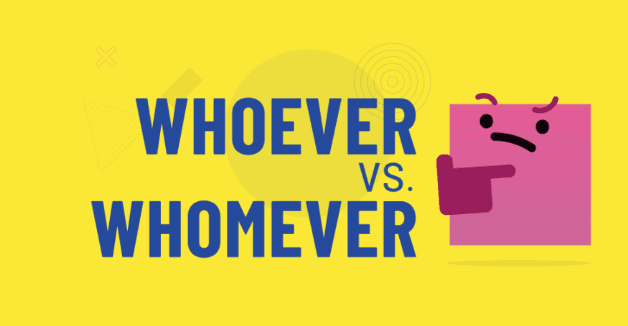Grammar Rules: When to Use 'Whoever' or 'Whomever'
Contents

Imagine you're chairing a meeting at your workplace, discussing the selection of a project leader. You say, "The task could be assigned to whoever or whomever showcases the best plan." Suddenly, you notice a few raised eyebrows among your colleagues. You wonder - did you use 'whoever' and 'whomever' correctly?
Incorrect usage of such pronouns can sometimes create confusion, leading to miscommunication.
It’s critical then, to master the distinction between 'whoever' and 'whomever'. Understanding this difference is not just about linguistic accuracy; it's also about effective communication. Let's delve deeper into these often confounding pronouns and decode their correct usage with examples and quizzes that can help make your spoken English more refined.
Understanding ‘Whoever’ and ‘Whomever’
'Whoever' and 'whomever' are often used interchangeably, but they serve different grammatical functions.
The term 'whoever' is a subject pronoun, meaning it performs an action. For instance, "Whoever arrives first will get the prize." Here, 'whoever' is carrying out the action of arriving.
On the other hand, 'whomever' is an object pronoun, which means it has an action done to it. For example, "Give the letter to whomever you see first." In this sentence, 'whomever' is receiving the action of being given the letter.
A helpful tip to remember the distinction is: if you can replace it with 'he' or 'they', use 'whoever'; if you can replace it with 'him' or 'them', use 'whomever'. For example:
Whoever eats my chocolates will have to buy me a new box (He eats my chocolates)
I will call whomever I want for help (I will call him for help)
It’s important to remember these rules as using correct grammar can make your English sound more polished and professional.
When to Use ‘Whoever’
'Whoever' is used as a subject pronoun in sentences, much like 'he', 'she', or 'they'. Here are some situations where you might use it:
When you don't know who will perform an action: "Whoever arrives first, please switch on the lights."
In if-clauses with hypothetical situations: "If whoever calls is a telemarketer, hang up."
Remember these tips when using 'whoever':
'Whoever' is always singular.
It can be used to start a sentence or clause.
When to Use ‘Whomever’
Use 'whomever' when you need an object pronoun in your sentence. For example:
When referring to someone who receives an action: "Give this report to whomever is responsible."
In questions where you need an object: "Whomever did you invite?"
Here are some tips for using 'whomever':
Like 'whoever', it's always singular.
It often follows prepositions: "For whomever the bell tolls."
Common Mistakes and How to Avoid Them

In the journey of mastering English, it's common for Indian learners to grapple with 'whoever' and 'whomever'.
Tip 1: Remember that 'whoever' is a subject pronoun like 'he', 'she', or 'they'. It refers to the person doing something. Example: "Whoever finishes first will get the prize."
Tip 2: On the other hand, 'whomever' is an object pronoun like ‘him’, ‘her’, or ‘them’. It refers to the person something is done to. Example: "Whomever you choose, let me know."
Here’s a comparison table highlighting correct usage:
Incorrect Usage | Correct Usage |
Whomever wins, gets a reward. | Whoever wins, gets a reward. |
Send the invite to whoever. | Send the invite to whomever. |
For more on this and other commonly made English grammar mistakes by us Indians, check out this Clapingo video.
Quiz - Whoever vs Whomever
Ready to test your understanding of 'whoever' and 'whomever'? Here's a quick whoever vs whomever quiz:
Choose the right word: ___ you choose will be perfect.
Is this correct? "Give it to ___ asks first."
Fill in the blanks: "___ called, didn't leave a message."
Which is right? "___ did that deserves an award."
Correct or incorrect? "She'll date ___ she likes."
Solutions:
1. Whoever, 2. Whomever, 3. Whoever, 4. Whoever, 5. Correct
How Clapingo Can Help
Clapingo's personalized coaching sessions are designed to simplify your English learning journey. Our native English tutors can guide you through intricate details such as the usage of 'whoever' vs 'whomever'. Not only will they provide easy-to-understand explanations of these rules, but they’ll also offer real-life examples and engaging activities to bolster your understanding.
So, stop worrying and join Clapingo today to master the nuances of English language usage with confidence and ease.
Some Parting Words
Let's quickly recap what we've learned about the use of 'whoever' and 'whomever'.
'Whoever' is used for subjects, meaning the person doing the action.
In contrast, 'whomever' is used for objects, meaning the receiver of the action. We’ve also seen some eye-opening whoever vs whomever examples, which added clarity to this topic.
Remember, mastering English is a journey. And every journey needs patience, practice, and persistence. Use these rules, take the whoever vs whomever quiz often to assess your understanding, and keep refining your usage.
But you don't have to do it all alone. Platforms like Clapingo are here to guide you through your English learning process with personalised coaching sessions tailored to your specific needs. With resources like Clapingo, every step would be more comfortable and clearer. Book your Clapingo demo now!
FAQs
1. When should I use 'whoever' in a sentence?
'Whoever' is used when the person in question is the subject of a clause. It generally refers to an unknown or generic person. For example, "Whoever solves this puzzle first will win a prize."
2. What's the correct situation to use 'whomever' instead of 'whoever'?
'Whomever' is used when the person in question is the object of a verb or preposition. For instance, "Deliver the box to whomever you see first in the office."
3. Is there any online tool like a whoever vs whomever checker that can help me practise?
Yes, there are many online quizzes and grammar checkers. You can also take a whoever vs whomever quiz on websites like Grammarly or Oxford English Dictionary Online to improve your understanding.
You may want to read
11 Of The Best Apps For Improving Your English Speaking Skills
Comments
Your comment has been submitted